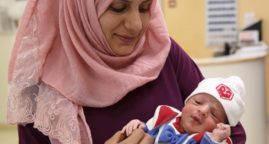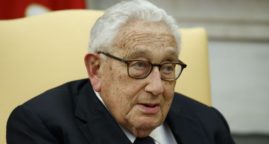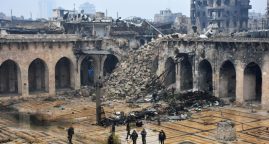Order of Malta | Migrants and refugees | Meeting in Rome
Discussing the main challenges and best practices of the Order of Malta’s interventions in Europe in the reception, assistance and integration of migrants and refugees was the aim of the meeting held on April 11th and 12th, 2018 at the Villa Magistrale, on the Aventine, in Rome. Operational managers of the Order of Malta projects in Italy, France, Germany, Austria, the Czech Republic and Hungary, as well as Malteser International, the international humanitarian aid agency of the Order of Malta , attended this meeting. The Grand Chancellor, Albrecht Boeselager, Grand Hospitaller, Dominique de La Rochefoucauld Montbel, Secretary General of the Order of Malta, Ambassador Stefano Ronca, Ambassador of the Order of Malta to the European Union, Yves Gazzo, and the Ambassador of the Order of Malta to monitor and fight the smuggling of people, Michel Veuthey, were present.
Ivo Graziani, Chief of Staff of the Grand Hospitalier, gave a general introduction on the humanitarian action of the Order of Malta in the context of migrants and refugees by presenting the following five services that the Order of Malta provides to refugees and to migrants in Europe:
- Rescue at sea, by the “Italian Relief Corps” (CISOM), assistance and health care, including mobile medical teams of the Order of Malta in Lebanon, by distributing food and medical first aid in train stations in Germany
- Education, including French courses for parents by the Order of Malta France, and in Germany, language and culture courses and access to the labor market
- Integration in Germany by professionals and volunteers facilitating integration into the labor market and approaches to the authorities. In Austria a network (Malteser Job Network) has been set up, including language courses, curriculum vitae assessment, contact with potential employers and support for job interviews, to give a different opinion of refugees as being able to contribute positively to the host communities. In the Czech Republic, the Order of Malta has taken charge of a program of integration of Christian refugees, including the reunion of families and the establishment of a first church in Arabic, whose masses are broadcast in Arabic to Iraq. .
- Legal support and follow-up in France for persecuted minority asylum seekers in Iraq and Syria and accompaniments in the procedures of the asylum procedure.
- Housing assistance in Germany and France.
Then intervened :
- For Italy, Mauro Casinghini, National Director of the “Italian Relief Corps” (CISOM), highlighted the contribution of medical teams of the Order of Malta aboard the boats of the Italian authorities: ten years of intense activity at sea Mediterranean helped rescue thousands of migrants.
- For the Order of Malta in Germany, Sebastian Schilgen presented the extensive program of reception and integration of “Malteser Werke”, active in the field of aid to migrants since 1989: German language and culture courses, psychological and social support, support for professional integration and specific assistance for people with disabilities and victims of human trafficking.
- For the Order of Malta France Clotilde Giner presented her legal assistance activities for religious minorities fleeing persecution and for immigrants placed in detention facilities, an important activity which, in 2017, benefited 6,300 migrants and refugees .
- The Order of Malta in Austria, the Czech Republic and Hungary, especially during the “Balkan Route” in 2016, stepped up their activities in favor of migrants by deploying volunteers along the main route across Europe from the East to provide assistance, shelter, food and medical assistance.
- The Secretary General of “Malteser International”, Ingo Radke, finally presented the challenges that “Malteser International” faces daily in the management of humanitarian emergencies. The international relief agency of the Order of Malta has to its credit a hundred projects in more than 20 countries.
The deep and complex causes of the ongoing movements of migrants and refugees have not been ignored during these two days. These movements are indeed destined to increase with the demographic growth of the southern hemisphere, with the prolongation and the multiplication of armed conflicts and with the climatic changes. As the Grand Chancellor Albrecht Boeselager has pointed out, “if they are not seriously taken into account by the international community, climate change will cause an ever greater increase in the number of migrants”. Without ignoring the imperatives of state security and political constraints, the Order of Malta must also assume an advocacy function by showing the human cost of current migrations, by encouraging the different actors to reduce this human cost, by supporting efforts to prevent such migration, by participating in the drafting in progress in 2018 of two World Covenants, one on refugees and the other on migration. It is in fact at the same time to defend norms and fundamental values of humanity, and also to face the unforeseeable in the immediate, by an action adapted to the local needs, in conformity with the principles of humanity, subsidiarity and impartiality.
The 900-year-old Order of Malta needs to maintain a long-term approach that includes both humanitarian action on the ground and bilateral and multilateral diplomacy to promote respect for the life and dignity of the people. human person, peace and reconciliation, religious freedom. It must also remain attentive to the evolving vulnerability of a growing number of people and prepare for the prospect of mass movements, caused by climate change, armed conflict, internal unrest and economic imbalances. .
Nearly fifty Ambassadors attended this meeting and expressed their appreciation for this exchange of views and expressed their willingness to support the Order of Malta.
Michel Veuthey Deputy Permanent Observer of the Order of Malta at the U.N. in Geneva
Geneva
Ambassador Stefano Ronca full speech
Excellences, Ladies and Gentlemen,
Thank you for being with us today.
Migrants in the world today amount to 253 million people 65 million of which are refugees or internally displaced people. From now to 2050 the world population will grow from 7.5 to 10 billion. Africa will double from 1.2 to 2.5 billion. The demographic issue is crucial and the increase of the migration flows reaching Europe is also huge. The average per-capita income in Europe is in fact around 35.000 euros while in Africa is 3.000.
If the leaderships of our countries will not intervene by planning and implementing coherent, consistent and humane responses to this phenomenon the consequences might be disastrous.
Migrations need in fact long term solutions while the time references of national politics are too often those of the elections. Migration is a global phenomenon, which requires collective decisions and actions. It is a permanent and growing issue to manage with care and vision and not as an emergency to face with partial and local solutions. No country can solve, by itself at national level the problems posed by migration.
The Order of Malta’s humanitarian action is spread around the world and covers many sectors.
Today we would like to illustrate to you how the Sovereign Order of Malta is, and can be, on the migration issue, a credible partner. You will be presented in the next interventions, the various areas of the Order’s activity, in providing help to refugees and migrants, and in supporting the Governments response. Search and rescue in the Mediterranean, legal support in France, integration and education in Germany and in various other countries, first aid along migration routes, medical support in the camps in Turkey, Lebanon, Iraq or Uganda, just to give some examples.
The Sovereign Order of Malta has its roots in accompanying, assisting and protecting pilgrims to the Holy Land and back already in the 11th century. But its role has evolved since then.
The Order has been for a long time and especially in the last decades, a reliable service provider to many Governments and international organizations. In 1989 it welcomed the massive number of refugees arriving from the Eastern European countries to the West. The Italian Relief Corps CISOM has been since 10 years on board of the naval units of the Coast Guards, Italian Navy and Guardia di Finanza in their search and rescue activity.
Other initiatives we have started in the field of migration concern trafficking in human beings. In this framework we have nominated a few months ago two ambassadors at large, one in Geneva and the other one in Lagos to fight trafficking. In the diplomatic field we are actively contributing in the process of drafting the Global Compacts on migrations and refugees at the United Nations in New York and Geneva. Moreover, a cooperation agreement with the European Commission is in force since 2009.
Libya is obviously another issue concerning the Order very much considering the fact that it is the bottleneck country where migrants remain stuck while trying to cross the sea and reach Europe. How dramatic their stay in Libya can be, is well known to all of you.
In the last few years, we received requests of support through Embassies and Official visits. We tried to give a positive answer when and where we could. Today we would like to better illustrate our competences and how partnerships with other countries can be established. At the end of the various presentations our experts operating on the field, who are with us today, will be at your disposal if you have questions or if you would like to receive more detailed information.
Additional documents
- Czech Republic Refugee and Migrant Aid
- Fact Sheet Austria
- Fact Sheet Czech Republic
- Fact Sheet France
- Fact Sheet Germany
- Fact Sheet Hungary
- Fact Sheet Italy CISOM
- Fact Sheet Lebanon
- Fact Sheet Michel Veuthey
- France Refugee and Migrant Aid
- Germany Refugee and Migrant Aid
- Human Trafficking 2018
- Hungarian OM : a possible way provide support for migrants
- Hungarian OM Water sanitation projects in Africa
- Malteser Austria Refugee and Migrant Aid
- Program OM Operational Heads of Refugee and Migrant Aid
Related Articles
Holy Family Hospital in Bethlehem: 4,700 babies born in 2018
12/21/2018. This is the only facility in the region capable of treating infants born before the 32nd week of gestation, thanks to its neonatal intensive care unit and its highly specialised staff.
The Coronavirus Pandemic Will Forever Alter the World Order
04/03/2020. The U.S. must protect its citizens from disease while starting the urgent work of planning for a new epoch.
“ICOMOS Guidance on Post Trauma Recovery and Reconstruction for World Heritage Cultural Properties”
03/23/2017. Engage together to preserve and pass on the heritage to future generations.






